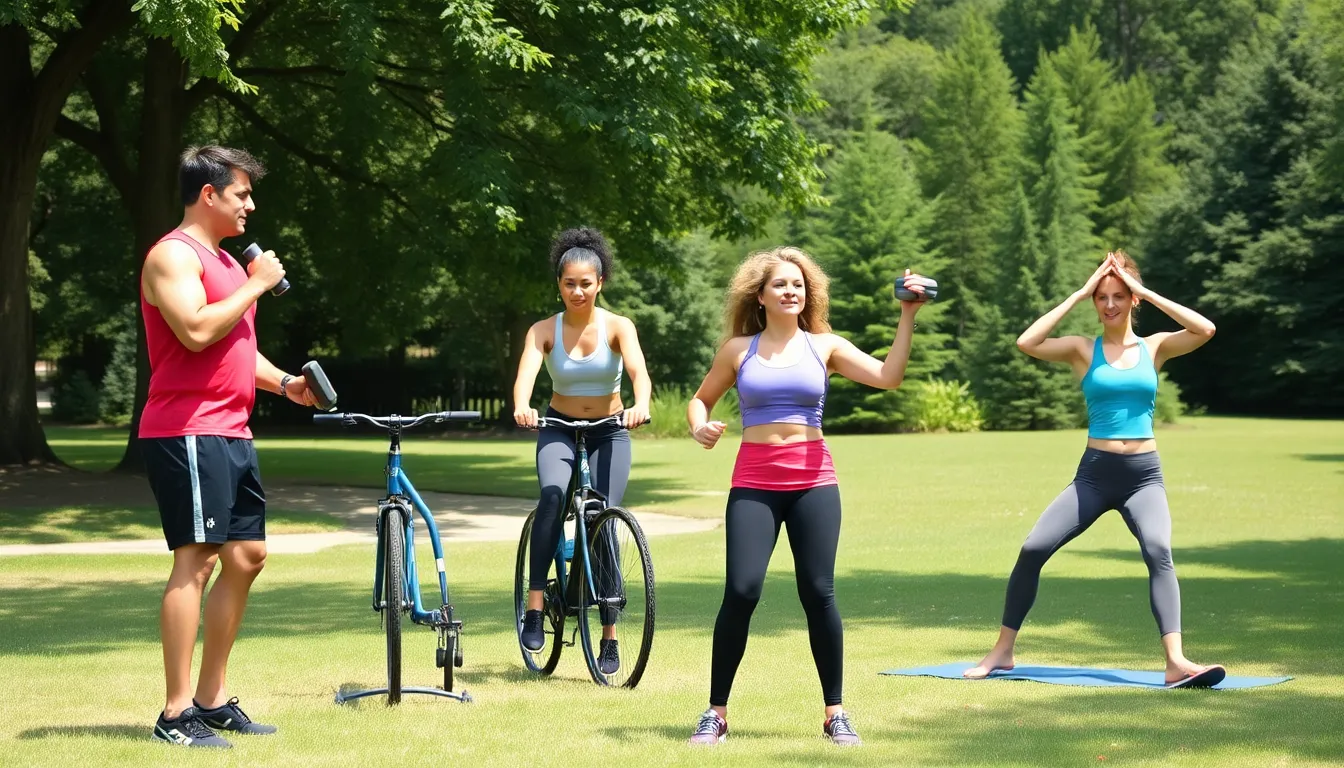In a world where couch-sitting has become an Olympic sport, finding the right fitness routine can feel like searching for a unicorn in a haystack. But fear not! Whether you’re a gym newbie or a seasoned pro, the right routine can transform you from a potato into a powerhouse.
Table of Contents
ToggleImportance Of Fitness Routines
Fitness routines contribute significantly to maintaining physical health and improving mental well-being. Regular exercise enhances cardiovascular health, strengthens muscles, and promotes flexibility. Engaging in fitness activities also supports weight management by increasing calorie expenditure. Many experts assert that structured workouts reduce the risk of chronic diseases such as diabetes and hypertension.
Consistency plays a crucial role in the effectiveness of fitness routines. Individuals who follow a regular schedule are more likely to see improvements in strength, endurance, and overall fitness. Developing a routine creates a sense of discipline, which can lead to enhancements in various aspects of life, including work and personal relationships.
Participating in fitness routines can also foster social connections. Group classes or workout sessions with friends provide motivation and accountability, making it easier for individuals to stick to their plans. Engaging in physical activities with others often leads to shared experiences that enhance enjoyment and commitment.
Moreover, fitness routines create mental clarity and reduce stress. Exercise promotes the release of endorphins, which improve mood and reduce feelings of anxiety. A structured fitness plan can serve as an effective outlet for personal stressors, leading to better emotional regulation.
Establishing clear goals can maximize the benefits of fitness routines. Setting specific, measurable objectives helps individuals stay focused and motivated. Tracking progress offers insights into personal achievements and highlights areas for improvement, enhancing overall enjoyment of the process.
Prioritizing fitness routines leads to a more balanced lifestyle, promoting both physical and mental health benefits. Embracing regular exercise fosters resilience, fortitude, and a greater sense of accomplishment in various life endeavors.
Types Of Fitness Routines

Fitness routines vary widely, catering to individual preferences and goals. Each type provides unique benefits that can enhance overall health and fitness.
Strength Training
Strength training focuses on building muscle and increasing overall strength. This type of routine often includes weightlifting, resistance bands, and bodyweight exercises. Compound movements like squats, deadlifts, and bench presses engage multiple muscle groups efficiently. Aiming for two to three sessions per week promotes muscle recovery and growth. Research indicates that strength training also boosts metabolism and aids in fat loss.
Cardiovascular Workouts
Cardiovascular workouts improve heart health and stamina. Activities like running, cycling, swimming, and jumping rope elevate heart rate effectively. Engaging in at least 150 minutes of moderate-intensity cardio weekly enhances cardiovascular fitness significantly. Group classes or outdoor activities can provide motivation and social interaction. High-intensity interval training, or HIIT, offers an efficient way to burn calories in a shorter period.
Flexibility and Balance Exercises
Flexibility and balance exercises improve stability and reduce the risk of injury. Yoga and Pilates both enhance flexibility while promoting core strength and balance. These practices can be incorporated into daily routines, requiring minimal time commitment. Stretching post-workout increases muscle elasticity, fostering recovery. Research confirms that maintaining flexibility promotes better posture and reduces tension. Engaging in balance exercises, such as tai chi, enhances coordination and overall physical performance.
Creating A Personalized Fitness Routine
Creating a personalized fitness routine involves understanding individual needs and preferences. This process starts with assessing current fitness levels to tailor workouts accordingly.
Assessing Your Fitness Level
Begin by evaluating cardiovascular endurance, strength, flexibility, and balance. Use methods such as timed runs or walks for cardiovascular assessment, while bodyweight exercises indicate overall strength. Performing basic stretches helps gauge flexibility. Regularly tracking these metrics allows for better understanding of strengths and weaknesses. Understanding current limitations provides a foundation for progress and improvement.
Setting Realistic Goals
Setting goals serves as a motivational tool in fitness journeys. Specific, measurable goals enhance clarity and focus. For instance, aiming for a 5K run within a specific time allows for targeted training efforts. Establish long-term objectives, like achieving a certain weight or fitness milestone. Break these into short-term goals, offering milestones to celebrate progress. Ensure goals remain attainable, as overly ambitious targets can lead to frustration. Consistently revisiting and adjusting goals fosters adaptability in personal fitness routines.
Common Challenges In Fitness Routines
Finding time for fitness routines poses a significant challenge for many individuals. Busy schedules often lead to prioritizing work and family commitments over exercise. Implementing a structured approach can help manage time effectively. Scheduling workouts as appointments can increase accountability. Setting aside specific days and times for exercise creates a consistent routine. Additionally, integrating physical activity into daily chores, like walking during lunch breaks or biking to work, maximizes time efficiency.
Maintaining motivation requires ongoing effort and creativity. Individuals may experience dedication fluctuations due to various factors, such as busy lives or lack of visible progress. Establishing clear goals fosters a sense of purpose in any fitness journey. Connecting with a workout buddy or joining group classes enhances accountability and social support. Exploring different activities can also reignite interest. Keeping track of progress in a journal or app serves as a great motivational tool. Celebrating small achievements along the way boosts morale and encourages continued commitment to the fitness routine.
Tips For Maintaining A Consistent Routine
Establishing a routine requires commitment. Setting aside specific times for workouts can increase adherence to a fitness schedule. Planning ahead often proves beneficial. Use tools like calendars or apps to schedule workouts and monitor progress.
Integrating fitness into daily life enhances consistency. Walking or cycling to work adds exercise without sacrificing time. Combining workouts with social engagements fosters motivation. Joining a fitness class or finding a workout partner can enhance accountability.
Staying motivated plays an essential role in maintaining routines. Regularly revisiting personal fitness goals keeps focus sharp. Adjustments to goals ensure they remain challenging yet attainable. Acknowledging achievements, no matter how small, reinforces positive behavior.
Finding enjoyment in workouts is crucial. Exploring various activities, like dancing, hiking, or swimming, creates excitement. Mixing up exercise types prevents monotony and keeps individuals engaged. Trying new classes or sports can discover untapped interests.
Tracking progress is an excellent motivation strategy. Keeping records of workouts and changes in strength or endurance fosters a sense of accomplishment. Visual representations of successes, such as graphs or charts, provide clear motivation to continue striving for personal goals.
Creating a support system enhances accountability. Sharing fitness journeys with friends or online communities offers encouragement. Participating in challenges with peers can spark competitive spirit and maintain enthusiasm.
Adjusting routines as needed demonstrates adaptability. Life changes, such as work schedules or family commitments, might require modifications. Flexibility allows individuals to maintain consistency without feeling overwhelmed.
Embracing a fitness routine is a powerful step toward achieving a healthier lifestyle. By understanding personal goals and preferences, individuals can create a tailored plan that fits their unique needs. Consistency and commitment are key to overcoming challenges and reaping the benefits of regular exercise.
Incorporating a variety of workouts not only enhances physical health but also boosts mental well-being. As individuals track their progress and celebrate achievements, they foster a positive mindset that encourages ongoing dedication. With the right approach and support, maintaining a fitness routine can lead to lasting improvements and a more fulfilling life.





